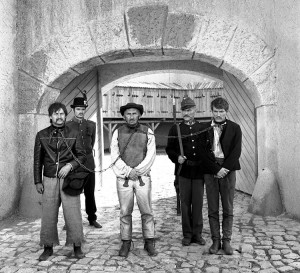 In The Round-Up, Austrian soldiers representing the triumphant Hapsburg empire trap and interrogate the Hungarian partisans whose revolt against the empire’s rule has petered out. The period is the mid-19th century and only the legendary Sandor Rosza’s fighters stand in the way, succoured by the peasants. The drama is virtually divested of characters we can either sympathise with or hate. Instead, it deals largely in formal, abstract generalities. It is as if Jancso is merely watching, regretfully conscious that there are those who will be killed and those whose job it is to kill them. A man running on the horizon is calmly shot down. Another is taken away to be tortured. Short words of command seem to be the apotheosis of dialogue. The film achieves, in one critic’s accurate view, “a total absorption of content into form”.
In The Round-Up, Austrian soldiers representing the triumphant Hapsburg empire trap and interrogate the Hungarian partisans whose revolt against the empire’s rule has petered out. The period is the mid-19th century and only the legendary Sandor Rosza’s fighters stand in the way, succoured by the peasants. The drama is virtually divested of characters we can either sympathise with or hate. Instead, it deals largely in formal, abstract generalities. It is as if Jancso is merely watching, regretfully conscious that there are those who will be killed and those whose job it is to kill them. A man running on the horizon is calmly shot down. Another is taken away to be tortured. Short words of command seem to be the apotheosis of dialogue. The film achieves, in one critic’s accurate view, “a total absorption of content into form”.
All this takes place on a very particular landscape: the vast, summer-scorched Hungarian plains where whitewashed buildings, cloaked men and their horses appear to be the only occupants. It seems like a world apart, but one able to illustrate both a specific vision of Hungarian history and part of the story of mankind, where the powerful slowly but surely triumph over the weak.
A part from the film




